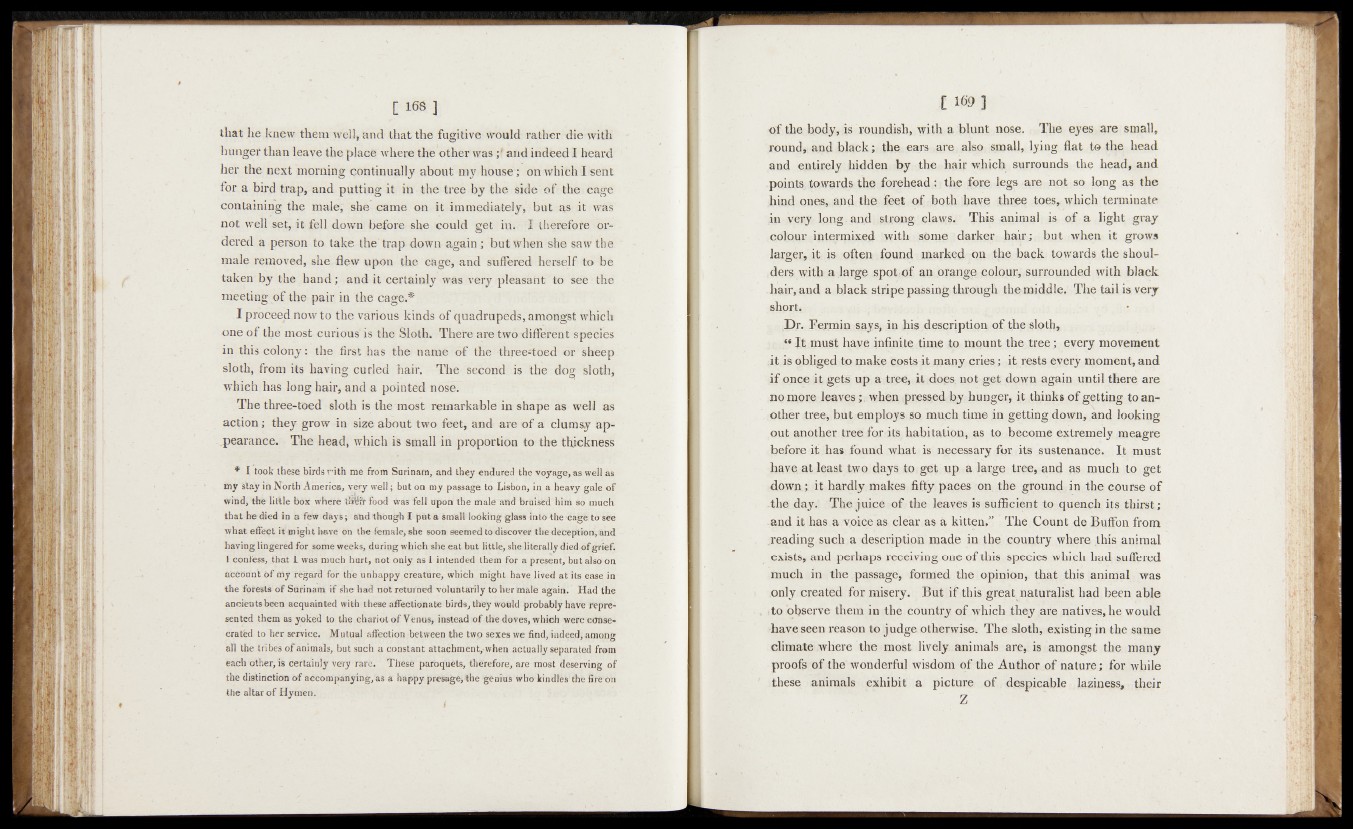
that he knew them well» and that the fugitive Would rather -die with
hunger than leave the placé where the other was -;f and indeed I heard
her the next morning continually about ray bouse; on which I sent
for a bird trap, and putting it in the tree by the side of' the cage
containing the male; she came on it immediately, but as it whs
not well set, it fell down before--she could get in. I therefore ordered
a person to take the'trap down again ; but When she saw the
male removed, she. flew upon the cage, ami suffered herself to be
taken by the hand ; and it certainly was very pleasant to see the
meeting of the pair in the cage.*
.1 proceed.now to the various kinds of quadrupeds, amongst which
one of the most curious' is the Sloth, Thebe are two different species
in this colony ; the first has the name of the three-toed or sheep
sloth; from its having curled hair. The second is the dog sloth,
which has long hair, and a pointed nose.
The three-toed sloth is the most remarkable in shape as well as
action ; they grew in size about two feet, and are of a clumsy appearance.
The head, which is small in proportion to the thickness
* I took these birds r-ith me from Surinam, and they endured the voyage, as-w.dlks
rhy stay ift North America, very well ; but on my passage to Lisbon, in a heavy gale of
wind, the little box whete m ê tt food Was fell upon’ the male and bruised him so' much!
that be eked in a few dàyk ; and though I put à irtfaîl looking glass intôthe’ëagë; to see
what effect it might bave on the fernale, she soon seemed todiscover th edétreption,â nd
having lingered for someweeks, during which ahe eat but Kttlq, shediterally diedbfgriefs
1 confess, that I was much hurt, not only as I intended them for a present, but also on.
â'céOtmt bf my regard for the unhappy creature, which might have lived at its ease in
the forests o f Surinam if she had not returned voluntarily to hfer male again. Had the
ancients been acquainted with these affectionate birds, they would probably have represented
them as yoked to the chariot o f Vénus, instead o f the doves, which were consecrated
to her. service. Mutual affection 'between the twp sexes we find,indeed;among
all the tribes o f animals, but such a constant attachment,-when actually separated from
each other; it éertuinîjr very rarè. Theâë pâtbquèts, therefore, are most deserving of
the distinction o f accompanying/as a happy presage»the genius Who kindles (he fire o'n
the altar o f Hymen.
I m ]
nf tbe b.otJy,;is roundish, with a blunt nose. The eyes are small,
round,; and b la c k th e ears ..are, also small, lying flat t© the head
and entirely hidden by the hair which surrounds the head, and
points towards the forehead: tlie fore legs are not so long as the
hind ones, and the feet of-both have three toes, which terminate
in yejiy. lqpg and strong claws. This animal is of a light gray
colour intejipixefl jy^ith(>;sbnte-darker h a ir;p b it when it grows
larger, it is often, found marked op tjie back towards the shoulders,
with a large spotpf an orangpj colour, surrounded with black
. hair, and a black, stripe passing through the-middle. The tail is very
Short, I . *
Dr. Ferrara says» in his description of the sloth,. ,
.g J t must have infinite time to mount the, tree; every movement
;it is obligeditp make COStsdt many cries; it rests eyery moment, and
if once it gets up a tree, itdoes; npt get down again until there are
no more leaveswhen .pressed by hunger, it thinks of getting to another
.tree/but employs,-so much time in getting down, and looking
out another tree ;fqr ■ its#. habitation, as t.o become extremely meagre
cbefore it has found what isig ^ ^ l^ ry fpr its sustenance. It must
have at feast two days to get up a large tree, and as much to get
down; it hardly makes fifty paces on;,the ground-in the: pourse of
.the day.! ' The juice of, the leaves: is .sufficient to quench its thirst;
.and it has a v,oiee as clear as a kitten/- The. Count de Buffon from
.reading such a description made in the country where this animal
exists, and perhaps receiving ope of this, speGies which had; suffered
much in the passage, formed the opinion,, that this animal was
.only, created for misery. But Lif^this great naturalist had been able
ito observe them in the country of which .they are natives, he would
have seen reason to judge otherwise. The sloth, existing in the same
climate .where the most lively animals are, is amongst the many
proofs of the wonderful wisdom of the Author of nature; for while
these animals exhibit a picture of despicable laziness, their
. Z 1